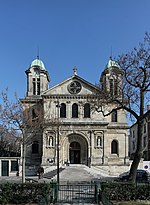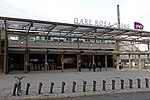École nationale supérieure d'architecture de Paris-La Villette
Architecture schools in FranceBuildings and structures in the 19th arrondissement of ParisFrance university stubsGeorgia TechSchools in Paris

The École nationale supérieure d'architecture de Paris-La Villette is a public tertiary school located in Paris, France. It is placed under the supervision of the ministry for the Culture and the Communication (Direction of Architecture and the Inheritance). It is one of the twenty public schools which exempt a higher education of architecture in France. The Georgia Institute of Technology College of Architecture (in the United States) maintains a small permanent presence at the school.
Excerpt from the Wikipedia article École nationale supérieure d'architecture de Paris-La Villette (License: CC BY-SA 3.0, Authors, Images).École nationale supérieure d'architecture de Paris-La Villette
Avenue de Flandre, Paris 19th Arrondissement (Paris)
Geographical coordinates (GPS) Address Nearby Places Show on map
Geographical coordinates (GPS)
| Latitude | Longitude |
|---|---|
| N 48.89361111 ° | E 2.38111111 ° |
Address
Votre Marché
Avenue de Flandre 146
75019 Paris, 19th Arrondissement (Paris)
Ile-de-France, France
Open on Google Maps










